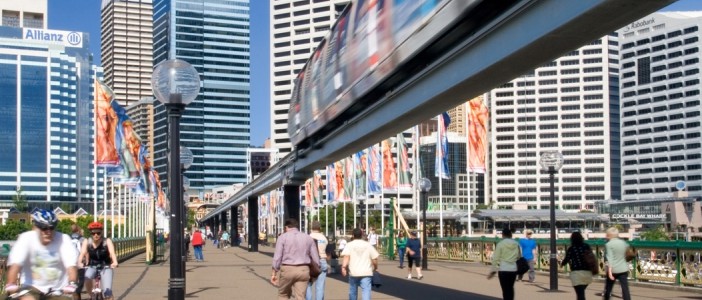Millions of Australians living in our cities are facing a bleak future. But they won’t need to if concerted national action is taken soon to alleviate a multitude of looming problems in our cities.
That is the stark message coming from a new bipartisan parliamentary report Sustainable cities by the House of Representatives Environment and Heritage Committee. The 187-page report details a litany of environmental statistics that paint a damning picture of extensive unsustainable practices in many of our cities.
On average each Australian creates 620kg of waste annually, second only to the United States. Australians are using 1,540 kilolitres of water per person, the most in the world—even more than those traditional champions of excess the US at 1,510kl or Europe’s 665kl.
The burgeoning new suburbs on our city fringes also mean that many Australians are driving 60 per cent further than they were in 1980. And Australians are getting fatter and less active, with obesity costing the economy up to $1.2 billion per year.
The report makes 32 recommendations including the scrapping of tax breaks for company or leased cars; lowering tariff concessions on imported four-wheeldrives; boosting Commonwealth funding for state public transport systems, especially city rail networks; federal funding for cycle paths; increasing the first home owners grant to $10,000 for people buying greener homes; and establishing a new Australian Sustainability Commission to oversee these changes nationally. Committee Chair, Mal Washer (Member for Moore, WA), stresses a national approach is needed by Australians living beyond their means, before it’s too late.
“Australia, as one of the most urbanised countries in the world, faces enormous challenges, with water shortages, transport congestion and high energy demands,” Dr Washer says.
“Healthy living cities are a community issue—it’s about our health, our wellbeing, our future and our children. We have to engage the community and not just at a government level.”
Deputy Chair Jennie George (Member for Throsby, NSW) says sustainability goes way beyond environmental issues. “Sustainability is not just a feel good issue, but also a very important economic imperative,” Ms George says.
“We see the sustainability agenda as being a really important driver of economic and productivity growth into the future. As important as the environmental outcomes are, there is also economic imperative that goes with it.”
Australian Conservation Foundation executive director Don Henry praises the raft of measures outlined in the Sustainable cities report.
“It’s encouraging to see bipartisan support for the initiatives outlined in this report, some of which have the potential to make a big difference to the sustainability of Australian cities,” Mr Henry says. “If implemented, these recommendations could significantly cut energy and water wastage in our cities and improve the efficiency and liveability of urban environments.”
As city temperatures appear to soar to new heights with every summer, concerns are also growing about the dwindling supplies of fresh water for Australia’s expanding cities.
“There is no doubt a number of Australian cities are in imminent danger of running out of water,” Dr Washer says. “We urgently need to substantially increase the amount of wastewater that is recycled.”
As anyone driving to work in Australia’s major cities can attest, more and more cars, trucks and buses are clogging up roads during peak hour.
“We need more funding for public transport,” Dr Washer says. “The committee heard evidence that if all the people who do travel by train to the Sydney CBD every day were to drive, Sydney would need to build another 65 lanes of freeway and more than 780 hectares of additional car parking.”
These concerns about the nation’s biggest cities are echoed by Sydney MP, Malcolm Turnbull. The Member for Wentworth has been vocal on a number of issues, especially Sydney’s water supplies.
“It is important to bear in mind that the neglect of sustainability in our major cities impacts on the whole of Australia,” Mr Turnbull says. “In my own city of Sydney, which is the largest single engine room of the Australian economy, the neglect of water and of mass public transport is putting significant strains on the city and its sustainability.
“Every Australian has an interest in the sustainability of all of our cities. We can’t put it off and say that it’s just a concern for NSW, or that’s just a concern for Queensland.”
While most of the areas covered are traditionally the preserve of the states and territories, the committee believes it is time for the federal government to take more of a leadership role. To oversee Australia’s move towards sustainability, the committee recommends the establishment of an Australian Sustainability Commission and an Australian Sustainability Charter. The committee wants the proposed commission to explore the concept of incentive payments to the states and territories for sustainability outcomes, along the lines of the National Competition Council model.
“There is a lot happening on the ground, and the committee was heartened to see that, but what is missing is coordinated action,” Dr Washer says. “The message of the report is that sustainability is the responsibility of every Australian, but mechanisms need to be put in place for the Commonwealth, together with the state and territory governments, to promote a ‘blueprint’ for our cities of the future.”
Harry Jenkins (Member for Scullin, Vic) says the inquiry wasn’t “just about the environment but economic and social issues—that’s what cities are really about”.
“A leadership role for the Commonwealth became obvious early in the inquiry,” Mr Jenkins recalls. “It’s also about partnership and cooperation because there are many authorities out there such as state governments, councils and local communities themselves trying to come to grips with a host of issues that this report highlights.”
Mr Jenkins notes the spiralling cost of petrol is already forcing people to seek alternative ways of getting to work. “We see people worrying about whether they can afford to get to work or take their family places, which means issues such as public transport ring even louder,” he says. “We see a great opportunity for the Australian government to enter into agreements with other levels of government, with local communities and industry to ensure that cities around Australia are more sustainable and are truly more liveable.”
The Member for McMillan (Vic), Russell Broadbent, is hopeful this report and its recommendations will prove a catalyst for change.
“People’s actions don’t change by rules, regulations or by force, but by desire and I hope this report is about the desire of the Australian people to do something together,” Mr Broadbent says.
“This is a great opportunity for us as a young nation to turn these cities around to become more sustainable cities in the future.” – See more at: http://www.stratavoice.com.au/blog/living/15-cities-worth-living-in/#sthash.qG0Tr5Sk.dpuf




